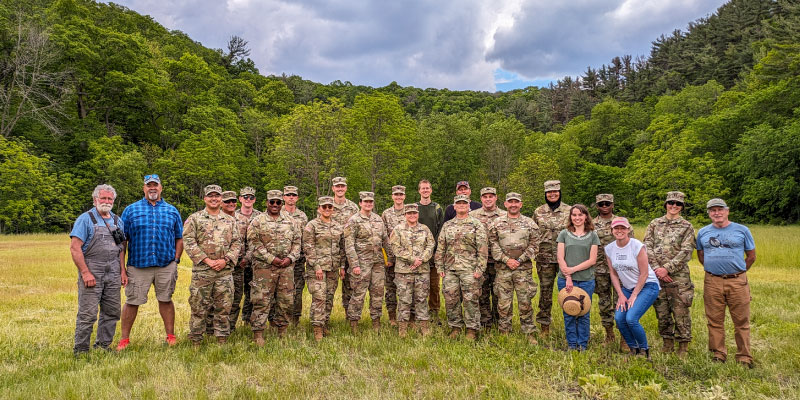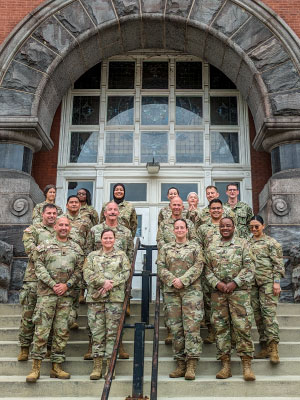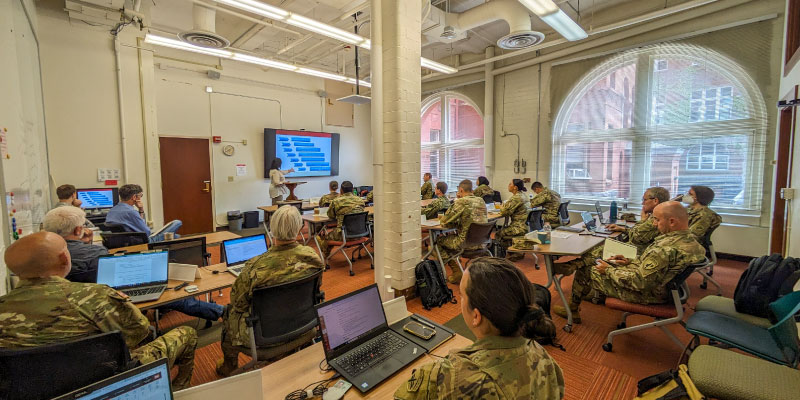
In the weeks following spring graduation, UW–Madison lulls. Dorms vacate, crosswalks idle, and classrooms empty. All is quiet on the campus front, but in Science Hall room 110, a group of 20-some folks gathered over a shared mission: learning tactics to help maintain stability in environments facing human conflict.
At 0900 on Monday, May 20, Colonel Andrew Scott DeJesse, senior heritage and preservation officer for the U.S. Department of Defense, greeted a room of lecturers and lieutenants, scientists and sergeants, outreach specialists and officers. The day began with an overview of the importance of the environment to military activities. It was the first of five days in a workshop jointly hosted between UW–Madison, the Nelson Institute for Environmental Studies, and the U.S. Department of Defense (DOD).

The workshop — U.S. Army Environmental Management for the Operational Environment — is the result of a two-year partnership between the UW and the DOD, which was signed into agreement in December 2022. ““This partnership fits perfectly within our work to advance a more environmentally, economically and socially sustainable world through innovation and collaboration,” said Nelson Institute Dean Paul Robbins at the signing.
“Protecting air, water, and wildlife should be a highest priority wherever the United States is involved around the world,” Robbins said following the workshop. “The officers I met in this program are terrifically thoughtful, prepared, and well-trained; they fill me with confidence. I am enormously glad we can make this a productive partnership.”
The two-year pilot program focuses on the environmental issues regularly faced by the U.S. Army Civil Affairs and Psychological Operations Command (Airborne) and its specialist group 38G/4E, comprising officers who are subject matter experts in the environment and natural resources. “All the participants are highly motivated natural resource experts who have worked in a wide array of ecosystems and political environments across the globe. Hearing their accounts of environmental challenges and Army operations was eye-opening,” said Aly Fleming, the Nelson Institute’s director of public-private partnerships, who helped organize the workshop.
“This collaboration has really been a two-way street,” said Cooper Rosin, lecturer and outreach specialist at the Nelson Institute who had a lead role in organizing the workshop. “We’ve relished our role as environmental educators … but we’ve also learned a lot individually and institutionally through the partnership. I’ve gained a great appreciation for how the military operates, and how their very skilled personnel can make an impact tackling real environmental challenges around the world.”
When war and armed conflict happens across the globe, the losses are immeasurable. This workshop zeroed in on the environmental impacts of human conflict, from habitat alteration to air quality impacts to water supply issues. Through a mix of lectures, discussion sections, and practical exercises, UW–Madison faculty and staff across schools and colleges shared expertise in areas like community engagement, conservation management, and international laws.
“The breadth and depth of expertise at the Nelson Institute and UW-Madison was on full display for the Environmental Management for the Operational Environment training,” said Captain Russell Martin, one of the workshop organizers from the DOD side. “The lectures we received from the respective experts in environmental governance, remediation, and conservation improved our team’s technical knowledge while also helping us develop innovative approaches to addressing some of the world’s most pressing environmental security challenges, especially those that climate change is predicted to amplify over the coming decades.”
The first day covered the human aspect of environmental management — from building partnerships to effective negotiation — led by the Nelson Institute’s Rob Beattie (teaching faculty) and Christopher Kilgour (community outreach manager). Day two covered broad environmental and conservation themes, including air and water quality, waste management, forest management, and conservation law. Day three then turned to resilience and change making, with experts on climate change, disaster management, and international governance.

After three days of learning in Science Hall, participants headed outside of campus for a day of on-site training. Their first stop was the Badger Army Ammunition Plant, located near Sauk City, Wisconsin, and a tour of the site’s museum with Curt Meine, museum curator and Nelson Institute alumnus and faculty affiliate. Built in 1942, this site produced munitions including smokeless powder for M-1 rifles during World War II and sulfuric acid during the Vietnam War. In 1977, the U.S. Army put the plant on “stand-by status,” where it remained until it was decommissioned 20 years later. Since then, ownership of the land has been transferred back in parcels to the Ho-Chunk Nation, the Department of Natural Resources, and the Dairy Forage Research Center, and efforts continue to restore the land. To continue their discussion on ecological restoration and environmental mediation, the workshop continued the afternoon just north of the plant at the Aldo Leopold Shack, a National Historic Landmark where Leopold once developed his now-textbook conservation principles.
Back in Science Hall, the final day of the workshop brought all the lessons together, encouraging participants to find ways to put their new knowledge into practice. “My only complaint is that it wasn’t long enough!” remarked one participant. But after a successful first run, this workshop could just be the beginning. “Connecting with the participants in this course was rewarding and inspiring,” Fleming said. “It’s clear there are so many potential collaboration opportunities where the UW could play a role in improving environmental security and lessening the environmental impact of military operations.”
“This USACAPOC-UW Nelson Institute partnership is a game-changer,” said organizer Lieutenant Colonel Angie Smith. “By equipping our service members with cutting-edge environmental knowledge, we’re empowering them to achieve mission success while promoting a whole-of-government approach. This is just the beginning of a long and fruitful collaboration.”